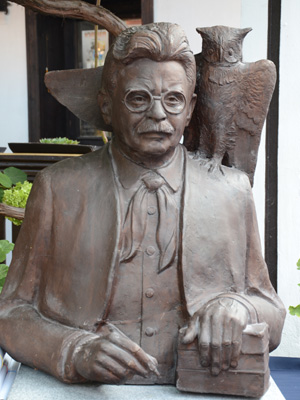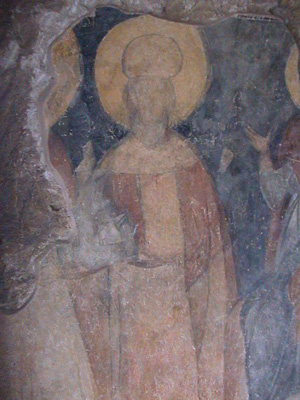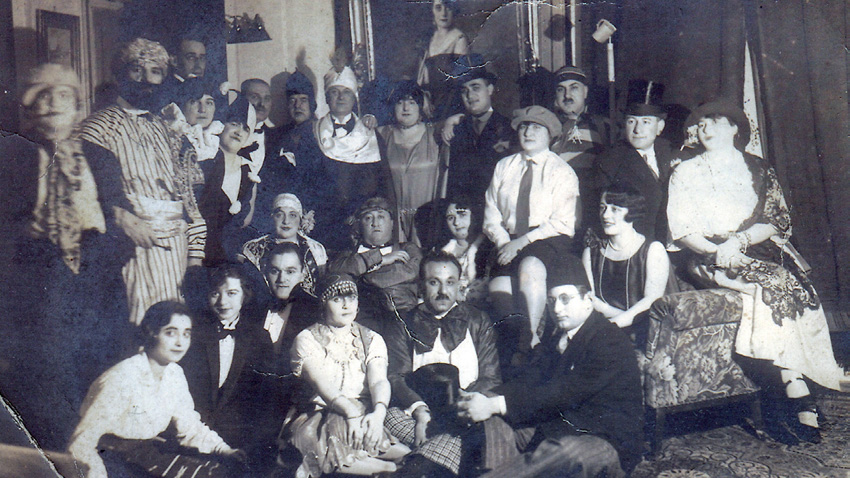 This is the name of a compilation, a traveling exposition and a multimedia website which illustrate via the testimonies of 30 representatives of the Jewish community its past and present day diversity in Northern Bulgaria. The regional historical museums of Ruse, Shumen and Varna are the authors of the project. Back in the 19th century this was the Bulgarian route to Europe and a significant part of its material and cultural dimensions was related precisely to the Jews from this poorly researched region. As Ruse-born German author Elias Canetti wrote: “I find it difficult to recreate the image of those early years in Ruschuk, of their passions and fears. Everything that I went through later on had already happened there. They used to call the rest of the world Europe”.
This is the name of a compilation, a traveling exposition and a multimedia website which illustrate via the testimonies of 30 representatives of the Jewish community its past and present day diversity in Northern Bulgaria. The regional historical museums of Ruse, Shumen and Varna are the authors of the project. Back in the 19th century this was the Bulgarian route to Europe and a significant part of its material and cultural dimensions was related precisely to the Jews from this poorly researched region. As Ruse-born German author Elias Canetti wrote: “I find it difficult to recreate the image of those early years in Ruschuk, of their passions and fears. Everything that I went through later on had already happened there. They used to call the rest of the world Europe”.
The approach of Prof. Dr. Nikolay Nenov, director of the Ruse Museum and author of the compilation, is similar:
It is exactly this polyphony of people’s personal voices that are the most common ones and have never thought of becoming part of public history which gives us the ground to assemble the puzzle, the pieces of the mosaics of this complicated life that we all have, thus clarifying and focusing the image. I think this helps all of us.
The video interviews lead us along the paths of life, tackling key issues such as childhood, family, neighborhood, holidays, suffering, work, the notion of the Promised Land… What is this Promised Land? Nissim Moysse Farhi born in 1923 says in one of the interviews: “We are the so-called Spanish Jews in the Balkans. We came here after 1492 when the inquisitors forced all non-Christians out of Spain”. Next to his words one sees the image of Sarah-Theodora – a Bulgarian queen of Jewish origin from the 14th century, depicted in the rock-hewn Churches of Ivanovo which were included in the UNESCO World Heritage List back in 1979.
 The Bulgarian tsarina of Jewish descent gave rise to the Shishman dynasty. Now it’s up to us to show the others who we are, both via our past and present, as it is much more useful to say: “I did that, this is who I am” in a constructive manner than simply lying on old fame. We might look one way to some people and differently to others, but above all we remain honest to ourselves.
The Bulgarian tsarina of Jewish descent gave rise to the Shishman dynasty. Now it’s up to us to show the others who we are, both via our past and present, as it is much more useful to say: “I did that, this is who I am” in a constructive manner than simply lying on old fame. We might look one way to some people and differently to others, but above all we remain honest to ourselves.
Sometimes this honesty has its paradoxes: a Shumen-born old lady now residing in Israel recalls how they waited at the old station for the train to the concentration camps in Germany-occupied Poland in the course of one long day. The grown-ups were crying while the children were happy because they were told that they would see new countries. When the people were allowed to return home in the evening, the grown-ups were happy and the kids started to cry…
Dr. Nenov sums up that the Bulgarian Jews also suffered their transition to Israel, their new country. At the end of our conversation he laughs, recalling a memory from the early 1990s when Israel was no longer an enemy state. His schoolmate Rubcho started sending more and more parcels with food to his friend in starving Bulgaria. Dr. Nenov would never forget the small packets with some powder inside – when boiled that powder turned into tiny potatoes!
That is the purpose of the project – to present the essence of a community via its memory.
Here is what Dr. Nenov’s final words sound like:
Suffering is everywhere. It is chasing us all the time. However, salvation is up to us.

You can see the entire project on http://pametta.com. The English version is currently being developed. The authors of the project will be glad to join any member of the community outside Bulgaria, regarding an eventual sequel. You may contact the publisher – the European Spaces 21 Association on this email: tsveta.nenova@gmail.com.
The usurpation of cultural heritage is one of the many inevitable consequences of any military conflict, both historically and today. Until the end of the war in Ukraine, it is impossible to adequately analyse the extent of the damage caused to the..
Athens plans to modernise the Greek army by 2030 Greece's Defence Minister Nikos Dendias presented the plan for changes in the army to the parties in parliament. The reforms will cover all three branches of the military. By 2030, 33 units..
A short video kaleidoscope of the "untold stories" of worthy Bulgarians - scientists, entrepreneurs, engineers, artists - who have contributed to our country's good image in the eyes of the world opened an unconventional public forum that showcased the..
Modernizing critical thinking skills, fact-checking skills and media literacy are essential for society, especially for young people in Bulgaria - the..
"You say you are Bulgarian, but you do not know Bulgarian" – this reproach from officials in Bulgaria has been faced by quite a few by our compatriots..
The survival of millions of people around the world, living in conditions of war, hunger, disease and immense despair, is at stake every day. We often..

+359 2 9336 661
